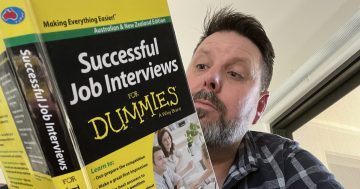Paul Lyons* says nervous people facing difficult situations are inevitably advised to ‘stay calm’. In fact the opposite may be the better course.
 Managing your own emotional responses to difficult situations or people is a key part of being mentally tough.
Managing your own emotional responses to difficult situations or people is a key part of being mentally tough.
One such situation that most people would judge to be difficult and uncomfortable would be public speaking, usually in front of a large and expectant audience.
I’m feeling nervous even thinking about it!
Using a mentally tough approach I would try and remove my emotion from the situation and remain calm through controlled breathing and visualising how I would want the presentation to flow.
So, I was interested to read an article by editor of The Atlantic, Julie Beck suggesting that “calming down” might not actually be the best advice before public speaking.
Anxiety is a multi-faceted, variable problem that affects many people. Everyone has different strategies for coping.
A recent study in the Journal of Experimental Psychology looked at one particular brand of anxiety — performance anxiety.
Because life is cruel, previous research has shown that anxiety can hurt performance, knowledge that certainly isn’t going to make anyone less anxious.
When faced with clammy palms or trouble breathing before a big meeting or public speaking event, the default advice is to try to calm down.
But Alison Wood Brooks of Harvard Business School looked into the effectiveness of doing just the opposite — getting excited.
Ms Brooks conducted a series of experiments designed to test the possibility of “reappraising” anxiety as excitement.
First, she asked participants in an online survey what the best advice for someone anxious about a presentation would be, to establish the general wisdom on coping with performance anxiety.
Next, a different group of 113 participants were asked to sing on a karaoke video game, an anxiety-inducing task to be sure.
Before singing, participants were assigned to tell themselves “I am anxious”, “I am excited”, or nothing.
Then the video game measured how well they performed.
Other experiments checked variables like familiarity with the song and confidence in one’s own singing.
Another similar experiment had participants make a short public speech, and tell themselves either “I am calm” or “I am excited” beforehand.
Three independent raters judged how well they delivered their speeches.
For an experiment where the task was math performance, rather than telling themselves to stay calm or get excited, participants received instructions to do so.
A final experiment tested the extent to which participants saw the math task as a threat or an opportunity.
The initial online survey confirmed that most people (85 per cent) thought the best advice in the face of performance anxiety was to try to calm down.
Participants sang better when they told themselves they were excited than when they said “I am anxious”, or nothing.
Participants in the excited condition were also rated as giving better speeches and performed better on the math task than those in the calm condition.
Ms Brooks also found that people who reappraised their anxiety as excitement were more likely to view the math task as an opportunity than a threat.
This study challenges the conventional wisdom that you should try to calm down if you’re feeling anxious before a performance.
Ms Brooks posits that this is because anxiety and calm are radically different emotions — one is high arousal, one is low.
In contrast, “anxiety and excitement have divergent effects on performance, but the experience of these two emotions is quite similar,” the study says.
So it might be easier to switch to excitement from anxiety than to calm down, a change which could dramatically improve your performance.
* Paul Lyons is an experienced business leader, adviser and coach enjoying a diverse career across Australia and Asia. He can be contacted at [email protected].
This article first appeared on the Mental Toughness blogsite.











